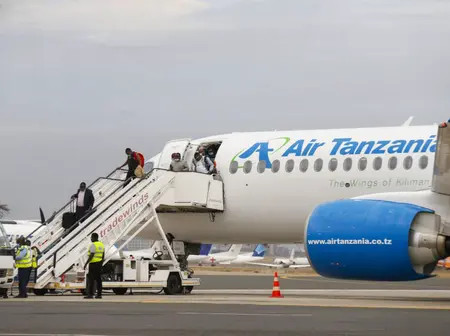Starting November 1, 2025, flying to Tanzania will become at least $90 (Ksh11,628) more expensive after authorities imposed a new tax on foreign travellers to finance a modern passenger data system.
According to the Tanzania Civil Aviation Authority (TCAA), the fee will apply to all international passengers arriving or leaving the country, including Kenyans, with airlines expected to include the charge in ticket prices.
The Passenger Facilitation Fee (VI Tax) will cost $45 (Ksh5,814) for one-way trips and $90 for round-trip trips. It is aimed at funding the rollout of upgraded technology to strengthen immigration checks at airports.
Exemptions will only cover infants under two years, airline staff, and passengers rerouted involuntarily. The levy will appear as a separate charge on tickets and will be refunded in cases of cancellations or unused tickets.
TCAA explained that the money will be used to build and maintain an Advanced Passenger Information System (APIS) and an electronic Border Control System (eBCS), which will screen travellers before they arrive, curb terrorism and cross-border crime, and expedite processing.
The agency noted that the absence of these systems was flagged as the sole weakness during the 2023 International Civil Aviation Organisation security audit.
“Given the cost associated with implementation of this project, including but not limited to the cost of data processing, system modernisation and regulatory compliance, including data privacy standards and cyber security enhancements, reliance on government financing is costly and may not be sustainable,” said TCAA in a statement as reported by The East African.
“Introducing the fee for APIS/eBCS ensures the system remains efficient, secure, and financially sustainable while distributing costs fairly among stakeholders. The fee will ensure the long-term reliability of APIS/eBCS, providing continuous funding for maintenance, staff training, and operational improvements.”
However, experts contend that the levy is excessive if its sole purpose is to fund the development and upkeep of the systems.
“The actual cost of providing these services is nowhere near as high as is being levied,” argued Sean Mendis, an aviation expert and former COO of Accra-based Africa World Airlines. “So it is no doubt being used as a general revenue-raising initiative under the cover of security.”
The African Airlines Association has recently raised concerns over countries hiking aviation charges—particularly passenger entry and exit taxes—and using them mainly as revenue streams. In Tanzania, the move is expected to significantly impact tourism and visitor numbers, especially since Dar es Salaam introduced compulsory travel insurance of $44 (Ksh5,684) in June, with the policy set to take effect in January 2026.
Finance Minister Mwigulu Nchemba explained that the insurance will cover “travel-related health emergencies, repatriation costs (both medical and bodily), accidents, baggage delays, and theft.” Travellers from EAC and SADC member states will, however, be exempt.
However, local tourism stakeholders and analysts have criticised the fee, warning that it could undermine the sector’s earnings—which are among the country’s top foreign exchange sources—and that combining it with the new levy will push airfares even higher for both tourists and residents.
This new travel fee comes close to a month after Kenya Airways (KQ) and Air Tanzania Company Limited (ATCL) signed a landmark Memorandum of Understanding (MoU), which laid the groundwork for broad collaboration between the two national carriers.
The MoU is set to prioritise cooperation over competition, focusing on sustainable, cost-effective growth and improved service delivery. Key areas of collaboration include the exchange of technical expertise and best practices in human resource training, engineering, aircraft maintenance, cargo operations, and Maintenance, Repair, and Overhaul (MRO) services.
But a day after the MoU was announced, the Tanzanian government imposed restrictions on foreign participation in business, with President Suluhu’s administration prohibiting non-citizens from establishing or running 15 categories of enterprises.

Leave a Reply